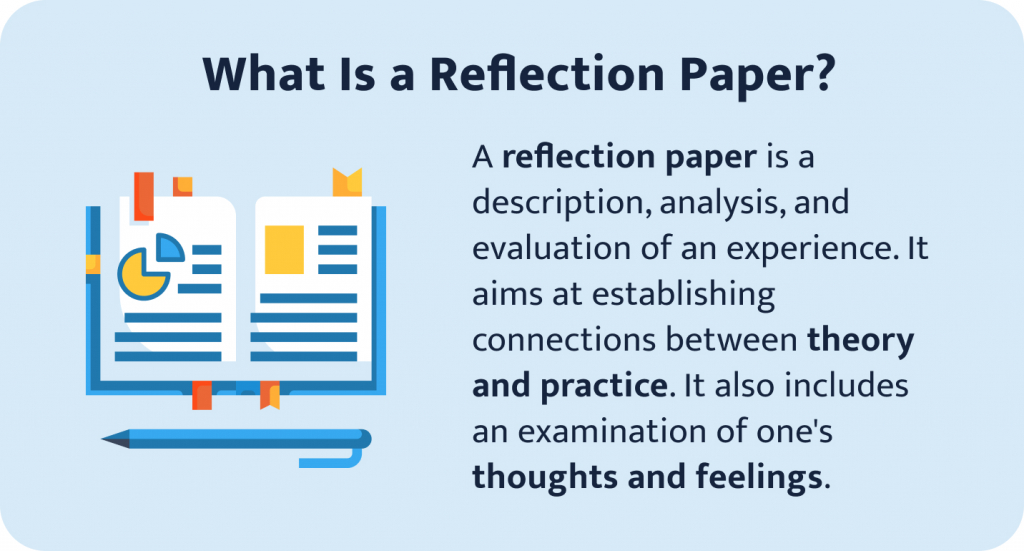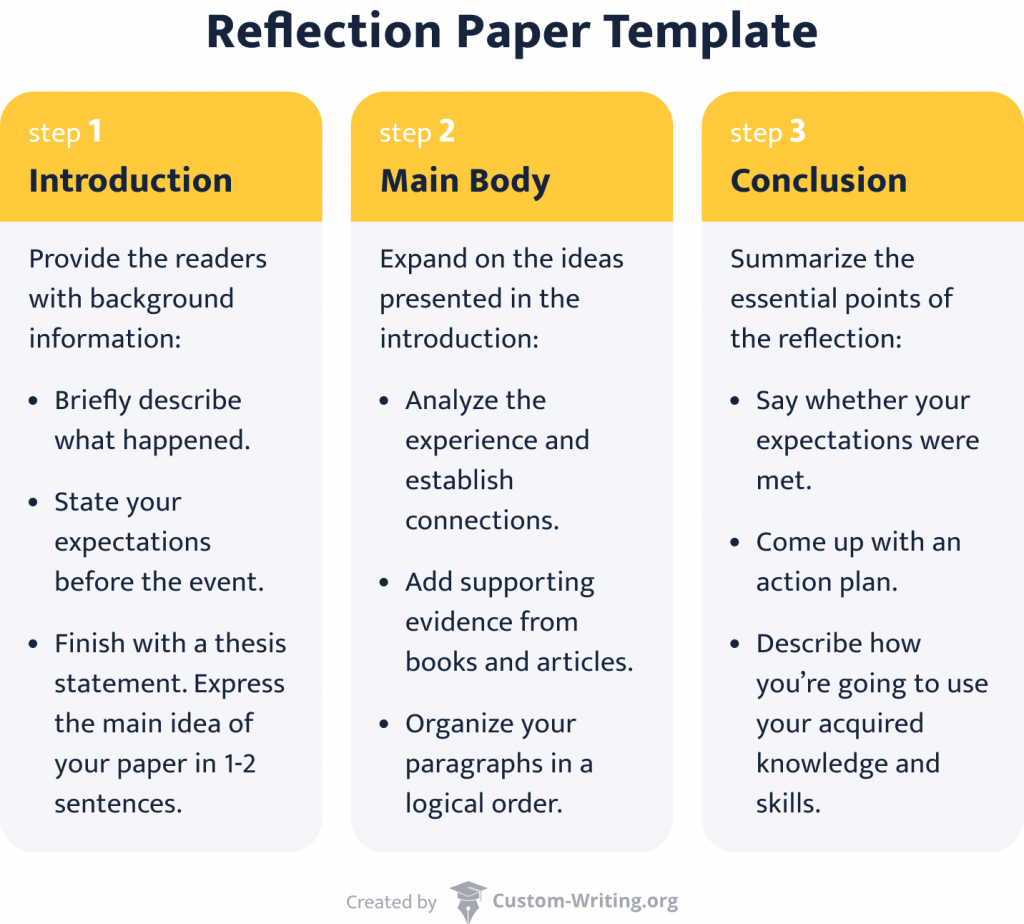Want to know how to write a reflection paper for college or school? To do that, you need to connect your personal experiences with theoretical knowledge. Usually, students are asked to reflect on a documentary, a text, or their experience. Sometimes one needs to write a paper about a lesson or a movie.
This assignment tests your critical thinking rather than your summarizing skills.
Struggling with a reflection paper? This article by our custom-writing experts will help you ace this task. Here you’ll find:
- A guide on how to write a reflection paper;
- Outlining and formatting tips;
- Reflection paper example & a template.
🤔 What Is a Reflection Paper?
As the name suggests, a reflection paper invites students to explore a personal experience, an event, or assigned academic material through the lens of their personal feelings and subjective reactions.

Unlike other academic assignments that favor objectivity and impersonality, this task invites personal analysis and subjectivity into analysis. This way, you can express your own thoughts on the value and relevance of the assigned topic.
Some examples of such assignments include:
- Reflecting on the book All the King’s Men and commenting on how it has changed your perceptions of politics.
- Analyzing the impact of a marketing workshop on your understanding of tactics in a variety of markets.
- Presenting your opinion on the impact of your latest travel abroad on your cross-cultural competencies.
To help you better understand what a reflection paper is and what it isn’t, check out this comparison:
Overall, a good reflection paper should link your opinions to broader themes, theories, and concepts you’ve studied. This way, it can serve as a bridge between theoretical knowledge and practice.
✍️ Reflection Paper Outline: How to Write
Let’s start with some pre-writing strategies. Here’s how to make a clear outline for your essay.
Step 1: Brainstorm ideas
Identify your central theme and write a summary of essential points. For example, if your topic is ”Psychological reasons for eating a lot of sweets,” you can come up with the following associations:
- Usually, I eat sweets when I’m sad or upset.
- I have read that people who lack love and positive emotions and feelings try to substitute it with food.
- My attitude towards sweets has changed after research.
You can then use these ideas to build your arguments.
Step 2: Analyze your ideas
Now, you need to connect your experiences with theoretical knowledge. The following list of questions will help you navigate your response.
“Before” questions:
- What concepts or theories are relevant to this experience?
- How am I going to apply my existing knowledge?
- What challenges can you anticipate?
“During” questions:
- Does this experience corroborate or challenge my theoretical knowledge?
- In what ways does this experience influence my understanding of the topic?
“After” questions:
- What connections can I make between this experience and my theoretical knowledge?
- Is there anything I could’ve done differently?
- How might this experience influence my approach to similar topics in the future?
Step 3: Organize your reflection essay
While planning what to include in your paper, keep in mind the following dos and don’ts.
What to do:
- Briefly summarize the key details
- Mention your feelings, emotions, and attitudes
- Relate your experiences with theoretical knowledge
- State your expectations and include supporting evidence
What not to do:
- Don’t focus too much on the summary
- Don’t overuse the first-person perspective
- Don’t squeeze several ideas into one sentence
- Don’t use one sentence structure all the time
🧩 Parts of a Reflection Paper: Introduction, Body, Conclusion
Want to know what exactly you should do to get an excellent reflexive essay? Read the following tips. They will help you write any type of reflection essay.
Reflection Paper Template: What to Include
Let’s have a look at your essay’s structure. Your paper should consist of an introduction, main body, and conclusion:

Want to know how to write each part? Keep reading!
Reflection Paper Introduction
The introductory part of your essay should be catchy, informative, and well-organized. To do it, follow these strategies:
- Begin with a hook. It can be a sentence in which you introduce the topic of your paper.
- Write some background information. For example, you can discuss major facts related to the issue.
- Add a thesis statement. It should reveal a clear position on an issue and outline the main points of your paper.
Don’t forget to reread your introduction each time before writing a new body paragraph. Make sure that all of them match the ideas covered in your introductory part and thesis statement.
Reflection Paper Body Paragraphs
After you’ve presented your ideas in the introduction, you expand on them in the body paragraphs. The most important thing here is to cover one point per paragraph and provide the necessary supporting evidence.
Here’s what to include in this essay part:
- Evaluation of your experiences. Point out what you liked and disliked about the experience.
- Analysis of acquired knowledge. Reflect on what you have learned by connecting your previous and newly acquired knowledge.
- Critique of the sources. If you disagree with someone’s theory or opinion, you need to defend your perspective using relevant evidence.
- The explanation of causes and effects. Explain what led you to your conclusions. It’s also worth mentioning some possible effects of these opinions on your future.
Reflection Paper Conclusion
Finally, write a conclusion using the following tips:
- Summarize the major points. You need to restate your thesis and mention essential aspects of each body paragraph.
- Identify your knowledge gaps. It’s important to reflect on what you don’t know about the topic. Additionally, explain how you are going to fill these gaps.
- Devise an action plan. Present the practical steps you’re going to take in the future.
🖊️ Reflection Paper Example in PDF
To help you write a flawless paper, we want to present you with free reflection essay sample you can use for inspiration. Below, you can download a PDF file with a fully formatted paper on personal experience with online classes:
Example:
The COVID-19 pandemic raised the need for educational means that will not potentially endanger the students’ health. As a result, the need for online classes sharply rose worldwide. However, it is difficult to conclude whether such practices have been successful so far, especially in regions that are considered least developed. According to my personal observations, online classes may represent a negative educational experience that will hinder its primary role as the means of passing on the knowledge.
📑 Example of Reflection Paper with Introduction, Body, and Conclusion
Working on this assignment can be problematic, so we’ve made this section for struggling collegegoers. Our short reflection paper example will cover the three essential components of these essays: introduction, body paragraphs, and conclusion.
A Critical Reflection on Crime and Punishment
Introduction
I’ve never been an avid reader in my childhood, but during my 20s and 30s, I’ve become fascinated with the world of literature. One of the most impactful novels I encountered during this time was Fyodor Dostoevsky’s Crime and Punishment. This story is set in 19th-century St. Petersburg and deals with what can be best described as a deep dive into a character’s hell, ending with a glimpse into their redemption.
Body Paragraphs
Much like in his other novels, Demons, The Idiot, and The Brothers Karamazov, this novel shows Dostoevsky’s mastery of developing an intricate cast of characters. What struck me most about Crime and Punishment is how well the author shows the deteriorating state of Rodion Raskolnikov’s character. It’s a haunting look into the mind of a person who barely makes ends meet and creates his twisted philosophy about the state of the world.
Another surprising thing about this book is that most of its characters are morally gray. I remember reading this novel in under a week, experiencing all kinds of emotions towards its main character. It all started with disgust at Raskolnikov, his squalor, and the horrendous ways he wanted to change his situation. But, as I’ve read more about Rodion’s family, acquaintances, and close friends, I realize this character’s many traits and facets.
Of course, like in many of Dostoevsky’s works, there were genuinely despicable characters to be found here. But their consciousness made life unbearable, even for them. By the end of the book, I felt relieved that despite what he had done, Raskolnikov could be redeemed and become better. Much like Dante, he has to go through hell to have a chance to reach heaven.
Conclusion
Reading Crime and Punishment has been a transformative experience for two reasons. First, it has shown me that doing evil in the name of good is ridiculous. Second, much like Raskolnikov, people who made mistakes and committed heinous acts can be redeemed if they repent.
️✅ How to Write a Reflection Paper: Different Types
Before you start working on your essay, let’s determine what you should deal with. There are several different types of reflexive essays. Make sure to choose the one that suits you best.
Personal Reflection Paper Writing Tips
In a personal reflection paper, you must present your attitudes, emotions, feelings, and experiences. Here’s how to do it:
- Describe the experience, including your emotions and feelings. It’s important to show them rather than just tell. The trick is to make the reader feel the same.
- Analyze your experiences and make connections with your present-day life. You can relate them to your study material or relevant theories and concepts.
- Conclude with your plans. Tell the readers how you’re going to implement this new knowledge.
And here’s what a personal reflection essay can be about:
Example:
How Claude Monet Inspired Me to Become a Painter.
Describe how art has always been your passion and how seeing Monet’s works inspired you to take up painting. Detail your journey as an artist and your future plans for perfecting your skills. You might also focus on the skills you’ve developed, such as patience and concentration.
Critical Reflection Paper Writing
In a critical reflection essay, you assess how theories can be applied in practice, examine causes and consequences, and find solutions to problems. It’s all about evaluating and changing your attitude towards an issue rather than summarizing events and details.
To write such a paper, follow this three-stage model:
- Describe the details of the issue.
- Relate your theoretical knowledge to the situation you discuss. How you do it depends on the questions you will ask yourself while writing. Consuder academic, personal, and systematic perspective on the issue.
- Think about the future outcomes. Ponder on how this situation will shape your further experiences.
Here’s what an essay of this type can be about:
Example:
Analysis of My Reaction to Ethical Dilemmas.
Examine a situation involving an ethical dilemma at work. Reflect on how you responded to it, the dilemma’s consequences, and what you learned from it regarding the decision-making process.
Reflection Paper on a Book
When writing a reflective essay on a book, remember that this assignment is not about summarizing the plot. It’s about analyzing and connecting the ideas presented in the text with your knowledge.
To write a perfect reflective paper on a book, take the following steps:
- Analyze the text’s ideas, purpose, and theoretical framework.
- Discuss the information that interested you the most. Mention what emotions it evoked, and say whether the ideas in the book are new to you.
- Describe how this information shaped your understanding of the subject. Also, state whether you agree with the author’s arguments.
- Show how the book helped to broaden your knowledge and challenge your assumptions.
Here’s a sample essay topic for a paper of this type:
Example:
How the Book Radical Forgiveness by Colin Tipping Changed My Understanding of Guilt.
In this essay, you can reflect on new and interesting information you discovered about the rational mind. Additionally, state whether you agree with the author’s idea of reliance on supernatural powers.
Reflection Paper on an Article
Usually, a reflection paper on an article usually concerns critiquing a written text or a speech. These strategies will help you write it:
- Start by describing your attitudes and expectations regarding the article.
- Refer to the passages that interested you the most: quote directly, paraphrase, or summarize them.
- Include your subjective opinion: it’s important not to overdo it.
- Combine formal and informal vocabulary to make your writing more expressive.
Here’s what such a paper can be about:
Example:
My Reflection on the Ethics of AI in Healthcare.
Analyze a scientific article discussing the challenges of using AI in healthcare, such as ethical issues and biases. Connect these with your own experiences and analyze how the article’s contents challenge or reinforce your preconceptions about artificial intelligence in medicine.
Reflection Paper on a Class
To write an effective reflexive essay about a lesson, you need to:
- Describe the lesson’s contents.
- Express your ideas and feelings related to the class.
- Mention what you’ve learned and how it affected you.
Here’s what an essay of this type can be about:
Example:
How Creative Writing Class Improved My Communication Skills.
Reflect on the skills you’ve gained in a creative writing class, particularly how they’ve improved your ability to express your ideas clearly. You can also explain how the course influenced your writing style.
Reflection Paper on a Movie
To write a reflection paper on a movie, follow the template below:
- Reflect on your emotions before, during, and after watching the film.
- Analyze your observations.
- Draw connections with the information learned in class.
Check out this example of a writing prompt on a movie:
Example:
The Lessons of Leadership in Hidden Figures.
Reflect on the inspiring examples of leadership and courage displayed in Hidden Figures. Discuss how the film changed your view on race and perseverance. How do these themes apply to your own life or society as a whole?
📚 Reflection Paper Topics
- Personal response to Letter from a Birmingham Jail by Martin Luther King Jr.
- Reflection on the importance of leadership in healthcare.
- Globalization of Missions by Kgatle: personal reflections.
- Personal reflection on social work policy and its values.
- Racism as an example of social injustice: reflection paper.
- Analyze your personal response to the sports industry’s cowboysization.
- Reflection on the immigration policy based on Paul Vitello’s article Kiss me, I’m Illegal.
- Personal response to William Shakespeare’s quotation, “For there is nothing either good or bad, thinking makes it so.”
- Reflection and evaluation of Gilman’s short story “The Yellow Wallpaper.”
- Importance of realization the policy of diversity: reflection paper.
- Reflect on the significance of the International Women’s Day celebration.
- Analyze the survey on nursing ethics and give your evaluation of its results.
- A personal reflection on the French Revolution and the value of liberty.
- Values and beliefs of nursing as a multifaceted healthcare area: personal evaluation.
- Brief analysis and personal evaluation of Christianity framework.
- Reflections on the portrayal of family in Homer’s Odyssey.
- Personal evaluation of Gary Smalley’s Hidden Keys to Loving Relationships.
- Reflect on the historical and literary significance of Chronicles of the Indies.
- What do leadership skills mean: reflection paper.
- Reflection on John Hume’s Nobel Prize speech and lecture about reaching agreement.
- Reflection on your personal nursing philosophy and beliefs.
- Personal response to Soderbergh’s film Contagion.
- Describe your impressions of The Love Suicides at Amijima by Chikamatsu Monzameon.
- Reflect on the meaning of art using the installation My Bed by Emin as an example.
- Analyze your thoughts and feelings evoked by the Epic of Gilgamesh.
- Does the idea presented in a series of stories The Things They Carried by Tim O’Brien correlate with your personal beliefs?
- Bachelor of Science in Social Work: reflection paper.
- Discuss the problems reflected in the documentary Autism: Insight From Inside.
- Present your reflections on single-parent families.
- Consider the crucial points of Cheleyem: An Experimental of Mapuche Film Program.
- The consequences of the COVID-19 pandemic: personal reflections.
- Present personal evaluation of the film Mi Familia directed by Gregory Nava.
- Bill of Rights: reflective essay.
- Describe the impression of the film Rampant: How a City Stopped a Plague by Victoria Midwinter-Pitt.
We hope that this article on a reflection paper has made things clear for you. In a nutshell, here are the main steps:
- analyze the situation;
- reflect on your feelings and experiences;
- connect them to your theoretical knowledge.
We wish you the best of luck with your assignments. Don’t hesitate to share this article with your friends!
Further reading:
- How to Write a Lab Report: Format, Tips, & Example
- What Is a Master’s Thesis & How to Write It: Best Tips
- Literature Review Outline: Examples, Approaches, & Templates
- How to Write an Annotated Bibliography: Tips, Format, & Samples
- 10 Research Paper Hacks: Tips for Writing a Research Paper
🔍 References
- Reflective Writing: UNSW Sydney
- Models of Reflection: LibGuides at La Trobe University
- Reflective Writing: Deakin University
- The Reflection Paper: University of Toronto
- Reflection Papers: Cleveland State University
- The 4Rs Model of Reflective Thinking: Queensland University of Technology
- Keys to Writing a Reflection Paper: Seattle PI
- How to Write a Reflection Paper: Trent University
- Reflection Template: University of South Florida
- Critical Reflection: University of Waterloo
- Critical Reflection: Texas A&M University
- A Short Guide to Reflective Writing: University of Birmingham
- The Structure of Reflective Writing: Monash University
- General Format: APA Style: Purdue University
- Using MLA Format: MLA Style Format



![How to Write an Argumentative Essay: 101 Guide [+ Examples]](https://custom-writing.org/blog/wp-content/uploads/2021/01/young-writer-taking-notes-284x153.jpg)

![How to Write about a Topic You Lack Interest in [2026]](https://custom-writing.org/blog/wp-content/uploads/2021/01/Frustrated-exhausted-young-woman-blogger-284x153.jpg)




![Best Descriptive Essays: Examples & How-to Guide [+ Tips]](https://custom-writing.org/blog/wp-content/uploads/2021/01/pencil-notebook-white-background-284x153.jpg)

Hi custom-writing.org admin, You always provide practical solutions and recommendations.
This information on reflective writing has been very helpful. Thank you so much.
Linda Grayson
Trevecca Nazarene University
Nashville, TN